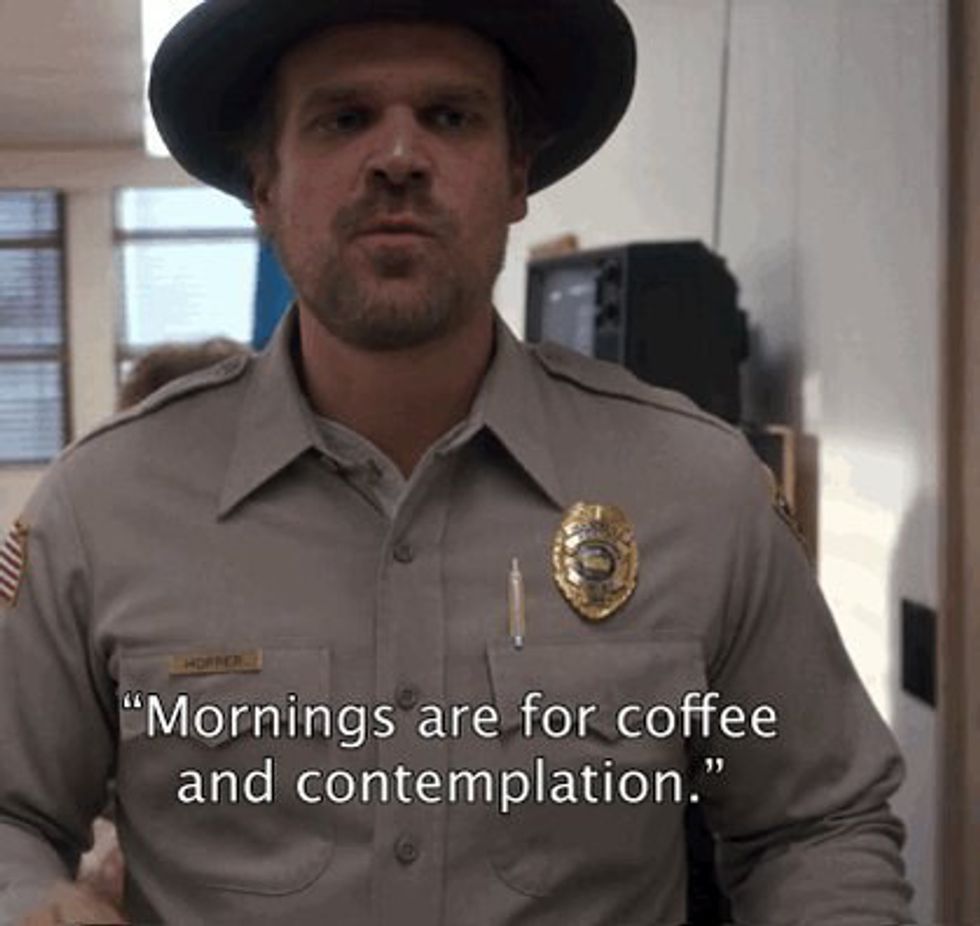I am a senior in college, and have never seemed to have time to substitute teach. However, when I took this semester off to focus on some family issues, I took an opportunity to sub in the district I'll be student teaching in. This week, I wanted to share some nuggets of truth that I've gleaned since September. These are lessons that are definitely true in the teaching world, but could also translate into the adult world quite nicely. Let's go on a journey, my friends!
Always be early.
Trust me, those moments of quiet mental prep will be your saving grace during the first half of your day.
Put your face on!
Many psychologists have conducted studies like this one which suggest that people--children and adults, alike—are more likely to respond to an attractive face than a less attractive one. Plus, the Sizers discussed extensively the importance of modeling desired behavior for students. When a teacher models taking care of herself, her students will notice. While it sounds like “You’re pretty Miss P!” now, it may eventually turn into, “Miss P took a lot of care to look professional and put together. I want to be like her.” As Sizer and Sizer wrote, “The students are watching.”
Play the Name Game!
Remembering someone’s name is an important step in building a successful rapport. That kindergartener may not remember how seamlessly you transitioned between literacy block and math, but she sure as heck will be telling her mom about how you didn’t get to know her. It’s worth it to take a few seconds to get to know everybody’s names and a little something about them, whether it’s as a sub in an elementary classroom, or working your way up the corporate ladder, or trying to find success in the entertainment biz.
Stay Positive!
Many schools are turning to positive behavior incentive programs like PBIS as behavior management systems because many researchers in education are well aware of the effects that positive reinforcement can have on behavior. These programs recognize the importance of positive feedback for good behavior and emphasize a growth mindset that fosters continued effort in any weak areas.
If you can’t be early, be on time.
In any professional setting, the staff is a set of moving parts that depends on others to run on time so that they can do the same. When you appear to your specialist at just the right time, their specialist teacher’s lesson runs more smoothly, and you get a full prep block to prepare for the rest of the day. Win-win!
Be consistent.
Remember: if you send one child to the bubbler for a drink, they’ll all need a drink within the next 30 seconds. It’s always important that those around you know what to expect from you so that they can adjust their own behavior accordingly. Consistency often translates into sincerity, when your colleagues have a clear idea of who you are as a worker and as a person.
Keep your voice low when you feel like yelling.
When the room is out of control, the last thing that’s needed is more noise and chaos, whether you’re in a classroom or a corporate setting. Instead, lower your voice, and for those subs out there, try freezing and using a silent signal like a finger over your lips to physically show students that their voice is out of control. Bonus: Giving further directions in a lower voice makes the students have to stop what they’re doing and listen closely so they don’t miss anything, and in a corporate environment, will encourage your colleagues to pay close attention when you speak!
Feed yourself.
Your students need a morning snack, water breaks, and lunchtime to keep themselves focused and working hard. Self-care should be an important part of your day, too, so don’t forget to pack your PB&J, your healthy snacks, and your water bottle—along with your Marylou’s fix.
Trust your teammates.
Many teachers believe that their classroom is a team, and that their students are teammates working toward a common goal. You’d be shocked at how much your students know about classroom routines and expectations, and it’s important to ask and let them show you, as this builds their self-efficacy. This holds true in the business world and in other fields, where you must trust your coworkers in order to accomplish anything.
Semper Gumby
To any Marine, this funny amalgamation of the Corp’s Latin motto and the funny green dude translates to “always flexible”. As an adult, a teacher, and especially as a sub, it’s important that you know when to roll with the punches, and change direction if need be. Which brings us to…
Let it go.
When you’resemper Gumby, you learn that your day will not always go as planned, and that’s ok. Your call-and-response didn’t work out like you wanted? Let it go. One student pushed your boundaries all day? Let it go. You didn’t get through every single assignment the teacher left? Let it go. If you can leave knowing that you tried your best and everyone got home alive, that’s a win—in school, and in life.
If you don’t know, ask!
No one expects you to know everything; that’s why teachers work in teams, and the administrators are a phone call away. You’ll find that many members of staff will not only be happy to help you, but will also admire your commitment to keeping students feeling safe and content despite their teacher’s absense. In fact, asking others for help can help build a friendly rapport in any workplace. In deferring to the other person, you send the message that you respect their expertise and their input on the matter.
Have fun.
If your eyes are glazing over during ELA time, pull up a(n APPROPRIATE) Youtube video reading, or have students say the words to a predictable text along with you. Make following directions into a low-stakes game. Make sure you’ve got all your babies with you by counting together in different tones of voice and at different volumes. When you’re happy, your students and/or colleagues will feel reassured by your joyful demeanor, which translates well into professional relationships and a positive work environment.
Be truthful.
Just like being consistent, being truthful is a facet of sincerity. Kids know when you’re lying, and will respect your honesty when you explain to them that the piece of paper in your hand is directions from their teacher, or admit that you’re not sure where their teacher keeps some supplies. Your colleagues will thank you for being frank with them, and will admire that trait in you.
Most of all, be yourself.
We’ve talked a lot about being sincere. This is the most important part, whether you’re in a classroom setting or not, and I’ll say this again because it’s worth saying: no one expects you to know everything. You are a sub—a guest. And no one expects you to perform perfectly. It’s okay to remind students that you are not their classroom teacher and may do morning meeting a little differently; in fact, this is a great way to model flexibility for your students. So what if they remember Miss P, who spilled the box of supplies and gave us all hugs for helping her pick it up? Who cares if they remember when Miss P accidentally came early to pick them up from Library and sat with them to listen to the librarian read the rest of a story? The important part is that they remember you, and that those memories of you are happy.
Whatever you do, remember to have courage and be kind. The students are watching, and even though you may not be with them long, they'll remember you.


























